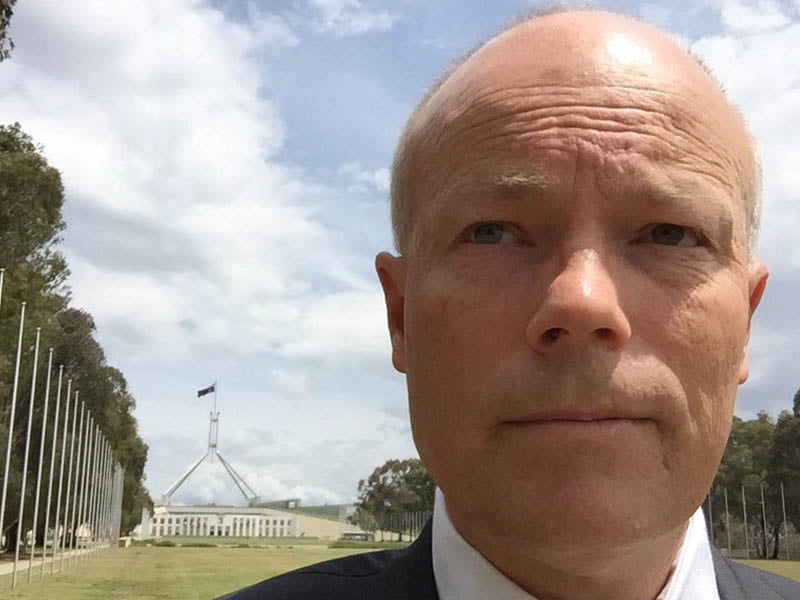Alastair MacGibbon has resigned from his role as the head of the Australian Cyber Security Centre (ACSC) and National Cyber Security Adviser.
Australian Signals Directorate director-general Mike Burgess confirmed Mr MacGibbon would finish up the high-profile role on May 28 for a position in the private sector.
“I regret to announce that Alastair MacGibbon has advised me of his resignation from the Australian Signals Directorate (ASD) to return to the private sector,” Mr Burgess said in a statement. “Alastair leaves a considerable legacy.”

Mr MacGibbon has been the public face of cybersecurity in Australia since he was handpicked by then-Prime Minister Malcolm Turnbull to be a special adviser of cybersecurity in May 2016.
The strength of his communications helped to cybersecurity issues into mainstream Australia. He personally handled multiple cases – everything from eSafety to tackling national cyber security threats, such as when the 2016 Census was disrupted by a cyber security attack, and more recently when the Australian Parliament’s computer network was hacked by state actors.
Mr MacGibbon has been with the Australian Signals Directorate since January 2018 after Mr Turnbull shuffled the ACSC under ASD and appointed Mr MacGibbon its head.
The resignation comes two weeks before the federal election and leaves a gap for the current government to fill. But it also offers the potential opportunity for an incoming government to change the way Mr MacGibbon’s role is structured.
His twin role as head of the ACSC and national cyber security adviser effectively gave him two reporting lines: to Mike Burgess at ASD on the one hand, and to Home Affairs secretary Mike Pezzullo on the other. The dual reporting lines are thought to have been a challenge
During a speech in Parliament in February, Opposition leader Bill Shorten said the dual hatted role in cybersecurity needed to change.
“Some are concerned that this dual-hatting creates fragmentation and stove-piping,” Mr Shorten said at the time.
“We need a cohesive national approach through the Cyber Security Centre as a single entity responsible for managing the cyber mission in totality and reporting up through a single chain.”
“We perhaps need to consider whether the Cyber Security Centre should be the single point of contact and accountability for all cyber-related communication, reporting, incident response, crisis communication, management, threat intelligence capability operations and policy,” he said.
“This centre should remain based in the Defence portfolio and continue to report to the Director-General of the Australian Signals Directorate.”
Australian Information Security Association chairman Damien Manuel – who is also director of cyber security research and innovation centre at Deakin University – has expressed his disappointment about Mr MacGibbon’s resignation.
“He was a strong advocate for cyber security and improving cyber security for small business as well,” he told InnovationAus.com.
“It’s a disappointment to hear he’s resigning but he has something lined up in the private sector now, which is a positive in that he has the experience of working deep within government, advising the PM.
“He has an understanding of the direction that policy is taking within Australia and he can leverage and use that in the private sector as well to make sure we, as a country, improve from a cyber security standpoint.”
Macquarie Government managing director Aidan Tudehope commended Mr MacGibbon on his role in bringing cyber issues into the mainstream.
“Alastair should be congratulated on helping people to understand that cybersecurity is an issue affecting everyone, not just something for techies and the national security community,” he told InnovationAus.com.
“He has been a brilliant communicator, particularly in times of crisis when he needed to strike a balance between explaining the seriousness of incidents, without creating unnecessary fear.
“He was also tireless behind the scenes helping boards and senior management understand that they could not leave cyber security to their tech departments but had to step up and take responsibility themselves.”
In the meantime, John Frewen, principal deputy director-general of the ASD, will add leadership of the ACSC to his responsibilities until the role is permanently filled.
Mr MacGibbon’s recognition comes just as former Prime Minister Paul Keating described security agencies as ASIO as “nutters” who “lost their strategic bearings”, accusing them of going “berko” and undermining the country’s relationship with China.
“When the security agencies are running foreign policy, the nutters are in charge,” Mr Keating told the ABC during an interview. “You’d clean them out. You’d clean them out.”
Do you know more? Contact James Riley via Email.

